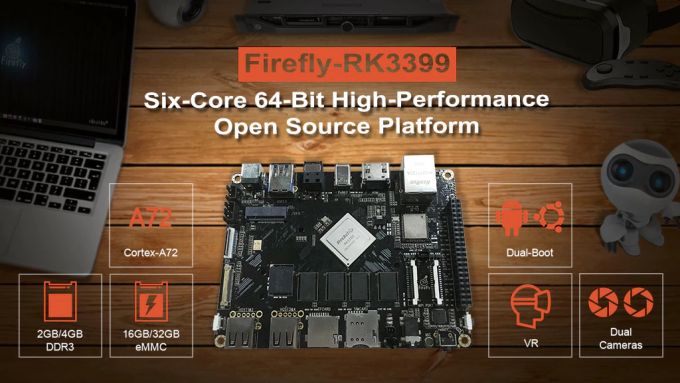There’s no shortage of single-board computers aimed at developers, but the Firefly-RK3399 is the first to utilize Rockchip’s RK3399 hexa-core processor with two ARM Cortex-A72 and four ARM Cortex-A53 CPU cores.
The makers of the Firefly-RK3399 board plan to begin shipping the system in March, assuming they raise at least $50,000 through a Kickstarter campaign.
Pledge levels start at $139 for a board with 2GB of RAM and 16GB of storage.
Update 6/3/2020: The Firefly-RK3399 is now available from the Firefly website for $149.

You can also pledge $199 or more for a model with 4GB of RAM and 32GB of storage.
Each board also has ARM Mali-T860 MP4 graphics, a microSD card slot and M.2 slot for storage for additional storage, HDMI 2.0, DisplayPort 1.2, 3.5mm audio, and S/PDIF ports, an Ethernet jack, 802.11ac WiFI, Bluetooth 4.0, and USB 3.0, USB 2.0, and USB 3.0 Type-C ports.
The board is aimed at developers/hackers, and also features a bunch of developer-friendly interfaces including a 42-pin GPIO header, a MIPI-CIS interface and dual signal image processor for up to two cameras.
The system supports Android 6.0 and Ubuntu 16.04 software and can support dual booting to let you flip back and forth between the two operating systems by rebooting.
The Firefly-RK3399 is positioned as a device that can be used as a PC, a server, or the foundation of DIY or development projects involving robotics, surveillance or other camera systems, virtual reality, automotive, or entertainment components.
via CNX-Software






Firefly RK3399 will have GPU & VPU Linux support.
Rockchip resources:
https://rockchip.wikidot.com/
https://rockchip.wikidot.com/rk…
https://github.com/rockchip-li…
Rockchip Linux Kodi
https://github.com/wzyy2/xbmc/…
https://github.com/xbmc/xbmc/p…
Drivers for e.g. GPU and VPU are available from the platform provider
https://github.com/rockchip-li… #GPU acceleration
https://github.com/rockchip-li… #VPU acceleration
From Firefly:
“about the linux support ,we are not alone, the ROCKCHIP has started to support linux already, check this : https://rockchip.wikidot.com/
our company has a deep relationship with ROCKCHIP, regularly they use our board for develop.
so , with ROCKCHIP’s help ,we can do much better.”
The RK3399 chipset can run Android 6, Linux, ChromeOS and Windows 10 mobile.
So ChromeOS and Windows 10 mobile should also be able to be ported or supported in future.
Still waiting on the vulkan support. No answers to questions about it from firefly other than “No plan, discuss later.” After clearly setting in their add that vulkan is supported. I’m regretting buying this board.
Stupid high price. Worth $60 at most.
agreed, the odroid xu4 (octa-core) has been around a while (well-tested) and is less than half the price
Chromebox without the case and expandable memory. Eventually, this chipset will be an excellent education market chromebook (good performance, low power, fanless). I would prefer this over braswell.
Until then it is just a curiosity.
Another useless product. No video support other than Android and Windows, no OpenGL support or apparently ANY Linux support so yea you can run Ubuntu if you like an unaccelerated framebuffer driven by an underpowered CPU. You do apparently get video decode, no idea what the license situation looks like though. You might get there through Vulkan support, eventually, license undisclosed, but if it really had everything needed to check the OpenGL box they probably would have done so outright.
How do you know they don’t have HW acceleration for graphics on the Ubuntu side. Maybe Rockchip or they have deloped the drivers?. Or did they say so?
It runs Windows?
ARM supplies DirectX version 11 drivers for the GPU, no idea if the SoC and/or board supports installing Windows. The vendor isn’t advertising support in the crowdfunding pitch.
Are the Mali drivers closed source? Is that what you mean?
No, he means that it is unclear if anyone actually supports their hardware video decoding.
Rockchip SOCs have a good history of being supported in Kodi for hardware h265 decoding, but that has typically been only in their Android releases.
$139? Really?